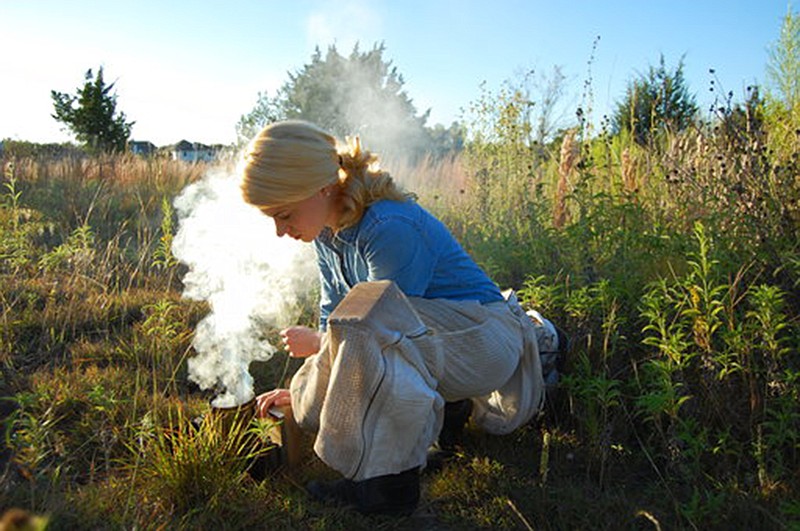AUSTIN- Once Erika Thompson got a peek into the world of bees, she was hooked.
"They're fascinating. Every time I get in a hive, I learn something new," said Thompson, a beekeeper who has made it her mission to educate the public about the tiny winged wonders. "And as a superorganism that's constantly changing, every hive is different, every time I get in it, and I never know what I'm going to find. It's exciting."
The Austin American-Statesman reports the chilly winter has prevented her from visiting the hives in recent weeks, as the bees are using all of their energy to stay warm. But when she checked on the hives last November, she spoke to her bees with the love and tenderness of a mother addressing her own children.
"Hi, babies!" she cooed, announcing her presence as she slowly approached through the tall grass.
Donning a beekeeping veil and gloves to shield her face and arms, she opened the hive to do one of her final inspections of the season before colder weather approached. The bees were calm and gentle, emitting a soft buzzing noise as they moved around her gloves while she lifted each frame to inspect the comb.
"They're being so well-behaved," Thompson said with a smile. "You know their mood kind of depends on the day."
The Katy native moved to Austin to attend the University of Texas, where she earned a degree in geography and environmental science, and she now works at a nonprofit architectural organization.
She attended her first beekeeping class a few years ago at Round Rock Honey.
"I was just always fascinated by insects," said Thompson, 32. "So I took the class, not necessarily even thinking I would ever be a beekeeper or set up a hive, but I kind of just wanted to learn more about the species and thought, 'This would be a fun thing to do on a Saturday afternoon.' "
In the following months, Thompson began researching honeybees and subscribing to beekeeping magazines. She received a beekeeping kit that Christmas and purchased her bees the next spring.
In hindsight, she recognizes the biggest mistake of her rookie year was placing her hive in her Central Austin backyard. The limited space and supply of pollen-producing plants in the central city provided complications.
"It wasn't that difficult until about the fall of my first year when . as their resources are depleting, (the bees) get a little ornery and their behavior changes," Thompson said.
After her neighbor had been stung while mowing the lawn, Thompson decided her backyard would no longer be a viable location for the hive.
"We immediately went to Randalls, bought a bunch of Saran wrap, some plastic bags and called my in-laws who lived out by the lake and said 'Hey, we're coming with a beehive!' "
Moving beehives is a delicate process. When honeybees forage for pollen during the day, they navigate by using the sun as a fixed reference point, returning to the hive just before the sun sets. This requires beekeepers to move hives at night once all the bees have returned to the hive.
"So we were moving this hive of angry bees, at night, about 30 minutes across town," Thompson regaled. "It was a harrowing feat, but we moved them, and sure enough they were a lot happier, and it actually allowed me to expand and start another hive and another hive. It turned out to be a blessing in disguise."
She split her hive the next season and continued to expand as friends and relatives offered her space on their properties. Now Thompson keeps her hives scattered across Austin, managing more than 20 hives for herself and clients.
She created a company called Texas Beeworks, which she runs on evenings and weekends. She hopes to someday shift into beekeeping full time.
"It's kind of hard to have that duality every day of wearing two different hats, navigating between the two worlds," Thompson said. "I'm definitely out on my lunch break going to check on the hives or consulting with clients about bees. And then after work spending a lot of time doing bee work, whether it's from afar or actual in-hive work."
The motto of her business-"Hives before honey"-reflects her focus on educating the public about bees and beekeeping for the health and wellness of honeybees.
While she occasionally sells honey in limited quantities through her website, she's pursuing a larger vision. Thompson hopes to someday maintain a network of hives, perhaps with a website that connects people to beekeepers based on their ZIP codes.
"For me, my interests lie more in learning about bees, helping other people become beekeepers and spreading awareness of the species than it is about harvesting and selling honey," Thompson said. "I never wanted to be a beekeeper for the honey."


